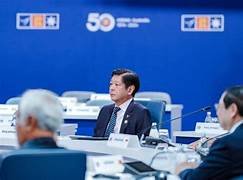In a recent development, Senator Marcos made a firm stand amidst the controversy surrounding the contempt order directed at Pastor Apollo Quiboloy. His decision to block the order has sparked widespread discussion and debate, shedding light on the delicate balance between judicial authority and individual rights in the Philippines.
The genesis of this issue lies in Pastor Quiboloy’s refusal to comply with a subpoena issued by the Senate. His defiance led the Senate Blue Ribbon Committee to move forward with a contempt order, a legal maneuver commonly employed to compel cooperation from uncooperative witnesses. However, Senator Marcos intervened, arguing that such measures could potentially infringe upon Pastor Quiboloy’s rights and liberties.
Senator Marcos’s position resonates deeply with the principles of justice and fairness. At its core, his stance reflects a commitment to safeguarding individual rights against arbitrary or disproportionate exercise of state power. In a society founded on democratic values, the protection of civil liberties is paramount, even in the face of perceived defiance or resistance.
The decision to block the contempt order underscores the importance of due process and the rule of law. While the Senate undoubtedly wields significant authority in its investigative capacity, it must exercise this authority judiciously and by established legal norms. Senator Marcos’s intervention serves as a reminder that the pursuit of truth and accountability must be tempered by respect for fundamental rights and procedural safeguards.
Moreover, Senator Marcos’s actions highlight the complexities inherent in balancing competing interests within the legal system. On one hand, there is a legitimate need to hold individuals accountable for their actions and ensure transparency in governance. On the other hand, there exists a duty to uphold the principles of fairness and proportionality, even when dealing with those perceived as obstructing justice.
Critics of Senator Marcos’s decision may argue that it undermines the Senate’s authority and emboldens non-compliance with lawful orders. However, such criticisms overlook the broader implications of unchecked state power and the potential for abuse if constitutional safeguards are disregarded. Senator Marcos’s intervention serves as a bulwark against the erosion of civil liberties and the arbitrary exercise of governmental authority.
Furthermore, Senator Marcos’s stance reflects a broader trend toward reevaluating the balance between executive, legislative, and judicial powers in the Philippines. In recent years, there has been increasing scrutiny of the concentration of power within government institutions and calls for greater accountability and transparency. Senator Marcos’s intervention aligns with these broader efforts to strengthen democratic governance and uphold the rule of law.
It is important to note that Senator Marcos’s decision does not absolve Pastor Quiboloy of his obligations to cooperate with the Senate investigation. Rather, it emphasizes the importance of pursuing justice within the confines of legal and constitutional parameters. In doing so, Senator Marcos upholds the integrity of the legal process and reaffirms the principles of fairness and due process.
Senator Marcos’s choice to halt the contempt order against Pastor Quiboloy illustrates a dedication to preserving fundamental rights and freedoms in the Philippines. By intervening to safeguard against potential oppression, Senator Marcos reaffirms the importance of due process and the rule of law in a democratic society. His actions serve as a poignant reminder that justice must be pursued with fairness and integrity, even in the face of resistance or defiance.









